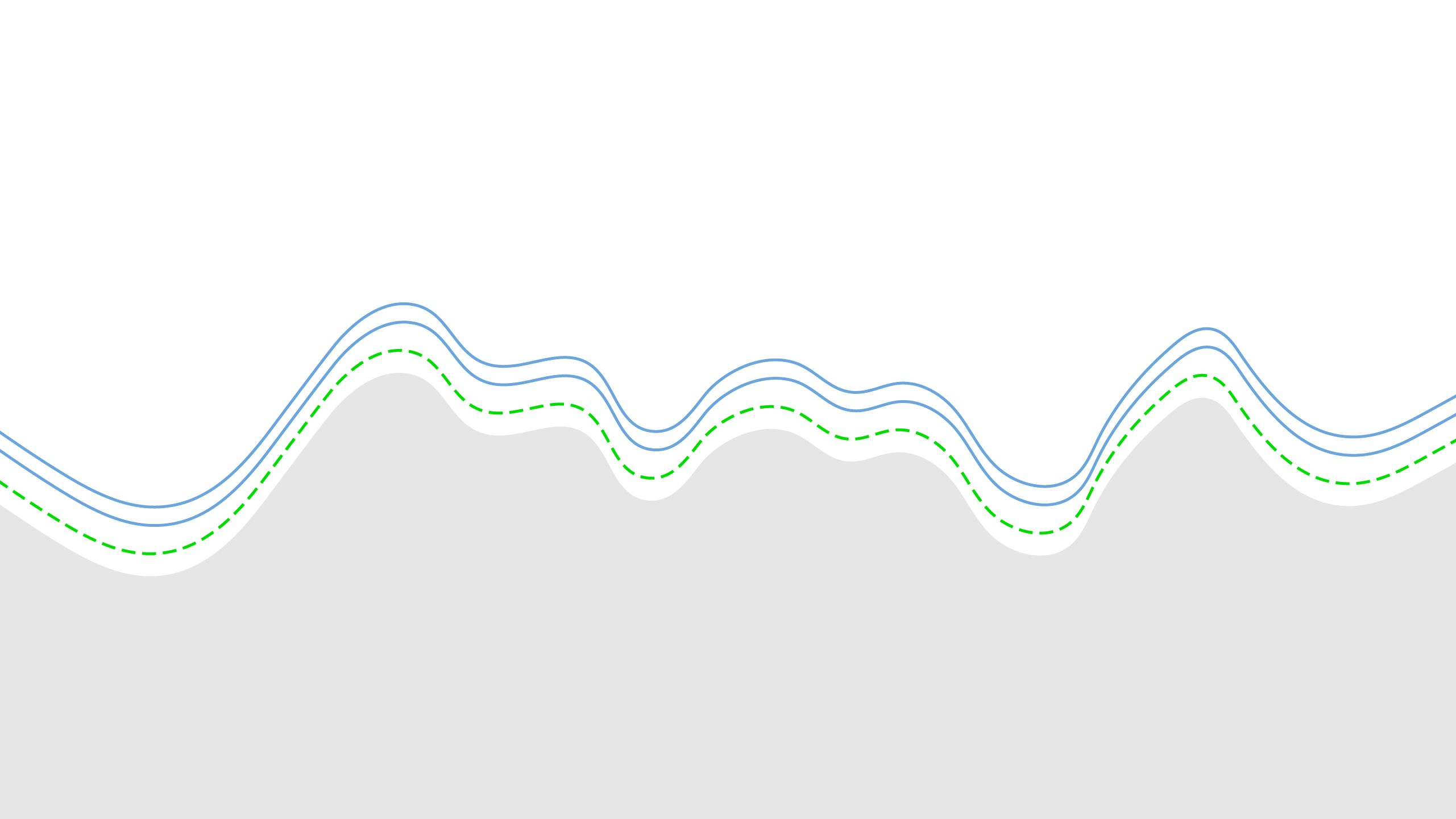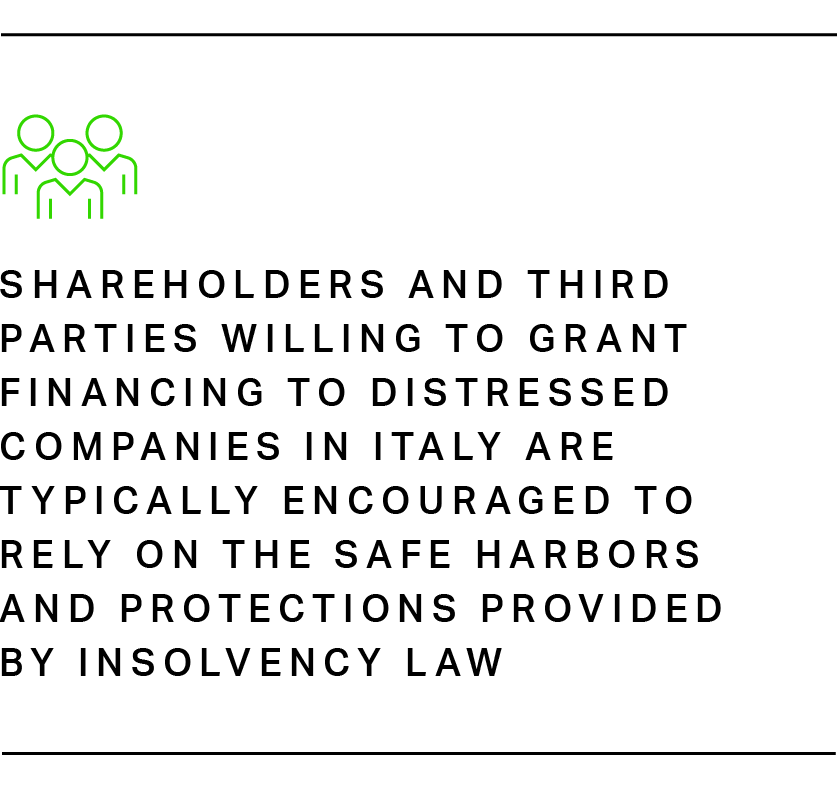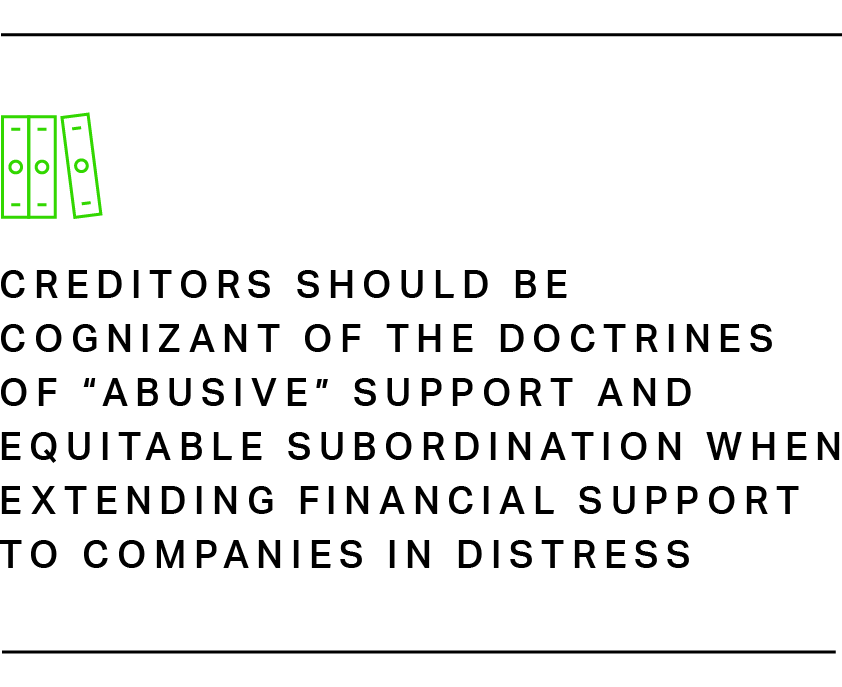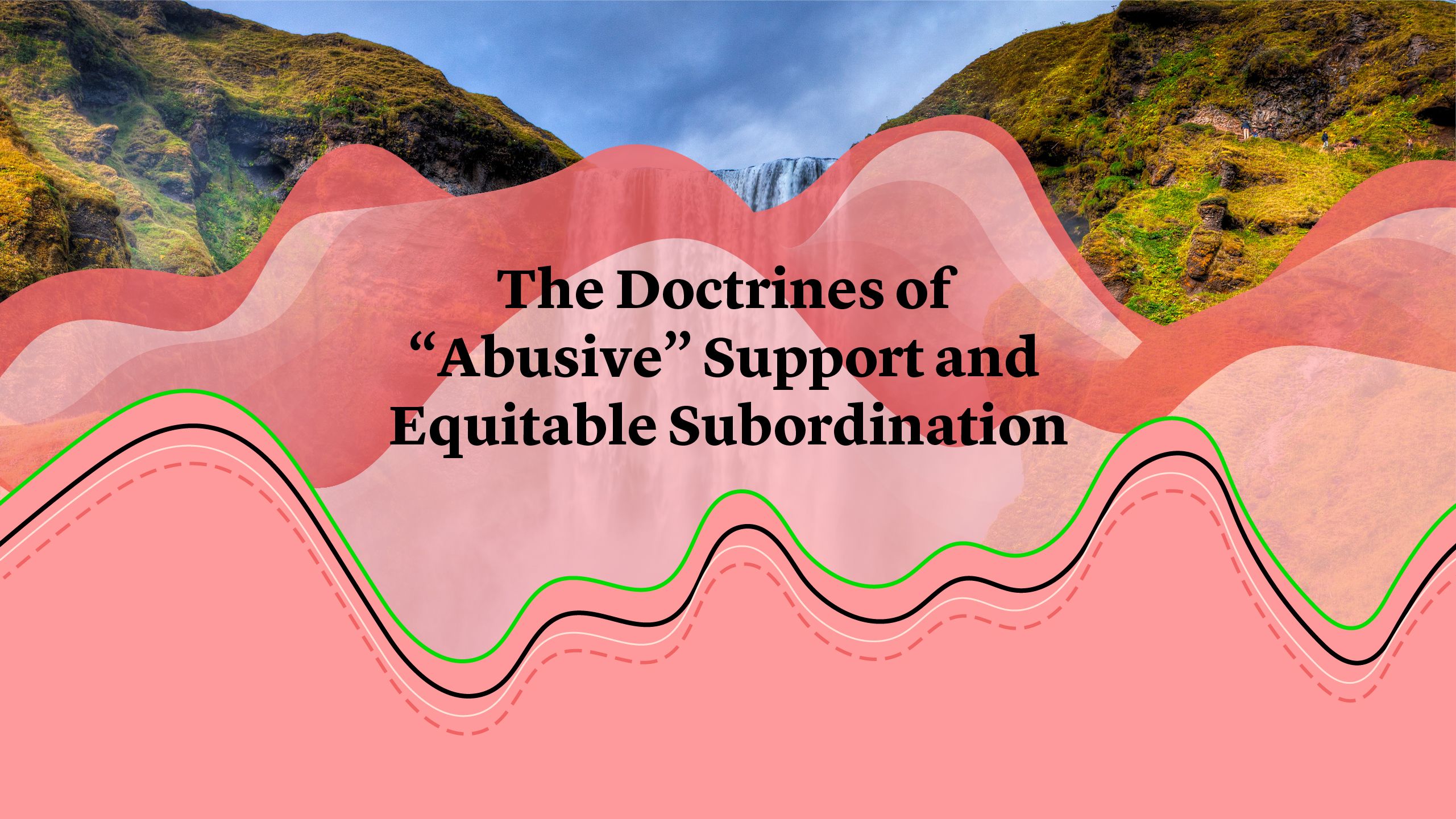
Financial support given by a shareholder or any third party (including banks) to a company in financial distress may in certain jurisdictions be considered “abusive” support resulting in adverse consequences for the support provider.
Relatedly, in certain jurisdictions, bankruptcy courts may lower the priority of a creditor’s claim by paying the claim of other, junior claimholders first by ordering the remedy of equitable subordination (or pursuant to comparable principles in other jurisdictions). Security obtained in such circumstances may be subject to challenge. Equitable subordination (or such comparable principles) and the doctrine of “abusive” support are both aimed at deterring, and correcting, inequitable or wrongful conduct by shareholder lenders and other creditors in distressed situations.
In this article, we will set out the main features of these doctrines in the following key jurisdictions – France, Germany, Italy, and the U.S.
Financial support given by a shareholder or any third party (including banks) to a company in financial distress may in certain jurisdictions be considered “abusive” support resulting in adverse consequences for the support provider.
Relatedly, in certain jurisdictions, bankruptcy courts may lower the priority of a creditor’s claim by paying the claim of other, junior claimholders first by ordering the remedy of equitable subordination (or pursuant to comparable principles in other jurisdictions). Security obtained in such circumstances may be subject to challenge. Equitable subordination (or such comparable principles) and the doctrine of “abusive” support are both aimed at deterring, and correcting, inequitable or wrongful conduct by shareholder lenders and other creditors in distressed situations.
In this article, we will set out the main features of these doctrines in the following key jurisdictions – France, Germany, Italy, and the U.S.



France
“Abusive” Support: Threshold and Mitigating Factors
Traditionally, French case law considers that a financing granted to a distressed debtor which subsequently goes bankrupt could classify as “abusive” if the financing was reckless because the situation of the debtor was irreparably compromised, or if the financing was granted under ruinous conditions (i.e., the cost of the financing exceeded the repayment capacity of the debtor).
The risk of liability for “abusive” support has been significantly limited since the 2006 reform. In particular, in the case of financing provided in the context of bankruptcy proceedings, a creditor can only be held liable for “abusive” support if, in addition to the above-mentioned criteria, it has committed fraud or interfered in the management of the debtor or if the security provided to secure the financing was disproportionate.
Given the limitations introduced since the 2006 reform, creditors are now encouraged to provide new financings in the context of court-supervised proceedings that are intended to find a solution to the debtor’s difficulties before it becomes insolvent. Financings granted in such context are unlikely to be considered as “abusive”, as those proceedings involve some level of court control over the new financings. This is particularly the case in conciliation proceedings, where financings granted as part of a conciliation agreement approved by the court cannot be considered as “abusive” and benefit from a new money privilege in case of subsequent bankruptcy proceedings (except for equity).
“Abusive” Support: Consequences
If the conditions for “abusive” support are met, providers of the “abusive” support may be liable for civil damages in an amount equal to the portion of the company’s liabilities that result from — or have been made possible by — the “abusive” support. This generally corresponds to the amount of the company’s liabilities that have been incurred since the grant of the financing, as the financing allowed the company which should have gone bankrupt to carry on its business for a longer period. The action shall be exercised by the representative of the creditors appointed in the bankruptcy proceedings. Creditors cannot take individual actions, except if they can prove that they have suffered a specific damage that is different from the damage suffered by the community of creditors.
Equitable Subordination
There is no concept of equitable subordination available under French law.


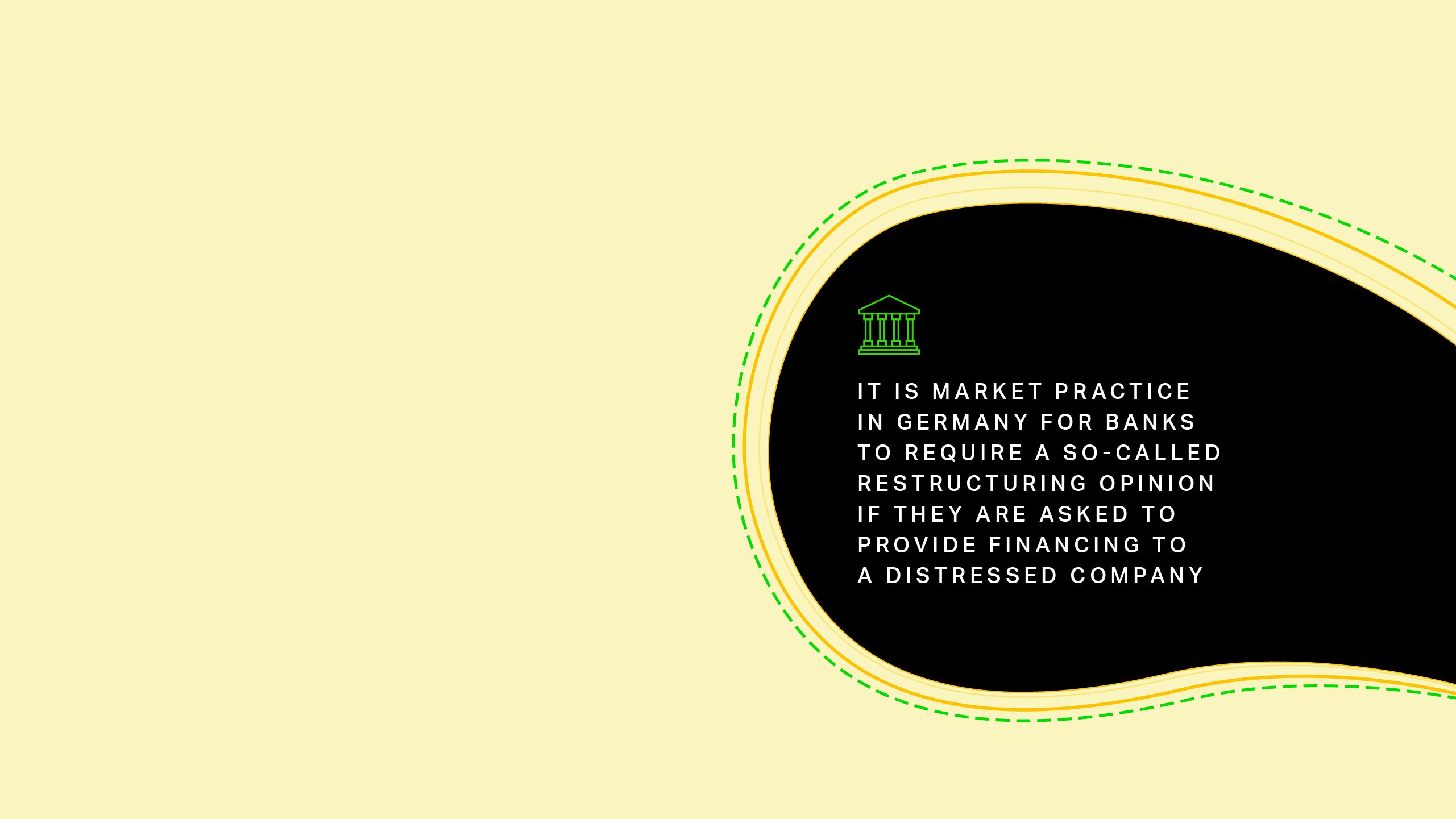
Germany
“Abusive” Support: Threshold and Mitigating Factors
Under German law, the question of “abusive” support pivots around whether the financing would merely prolong an otherwise inevitable insolvency filing, potentially coupled with the intention to prolong the filing for the benefit of the party providing the financing at the risk of other creditors e.g., trade creditors.
It is market practice in Germany for banks to require a so-called restructuring opinion if they are asked to provide financing to a distressed company (i.e., typically in case of an upcoming maturity or if the company is already nearing insolvency), evidencing that the financing is sustainable. Broadly speaking, a financing is considered “sustainable” if it can be expected to be repaid or refinanced at maturity. A restructuring opinion will usually go along with a financial and often also an operational restructuring.
Shareholders may have some more flexibility: if they are willing to absorb further losses and compensate these (e.g., through providing further financing), providing the refinancing might not constitute “abusive” support, depending on the facts and circumstances. This could be the case, for example, if a strategic shareholder is willing to continue funding the operations of a company incurring losses because the shareholder/parent company wants to retain the subsidiary for broader business reasons. In such a case, the point to stop the support would be when the shareholder/parent is no longer willing to provide such comprehensive further support.
“Abusive” Support: Consequences
Creditors providing “abusive” support to German companies primarily face the risk of civil law liabilities. The insolvency administrator is entitled to claim damages on behalf of persons who were already creditors of the debtor at the time the “abusive” support was provided. Such damages would be calculated as the difference between (i) the amount that the creditor would have collected had the “abusive” support not been provided and had the debtor properly filed for insolvency at such time and (ii) the (lower) amount that the creditor collects in the insolvency proceedings due to the late filing. Creditors who traded with the debtor after the time the “abusive” support was provided can themselves claim damages for all their losses incurred in respect of such trading activities due to the late filing i.e., they can claim full compensation.
Equitable Subordination
Debt financing provided by shareholders to their subsidiaries is generally subordinated by operation of law, and security provided to secure such subordinated shareholder debt is subject to challenge.


Italy
“Abusive” Support: Threshold and Mitigating Factors
No codified rule of Italian law provides for a definition of what constitutes “abusive” financial support. Under Italian case law, the determination of whether granting financing qualifies as “abusive” is typically based on the provision of financing to a company in a state of insolvency or severe financial distress where concrete prospects for resolving the company’s financial crisis are lacking. Knowledge by the lender of the state of distress or insolvency of the recipient company, potentially delaying the declaration of bankruptcy, is not the sole decisive factor. The critical consideration for such a determination often revolves around the absence of well-substantiated and reasonable prospects for effectively addressing the financial crisis, to be evaluated on a prospective basis.
Shareholders and third parties willing to grant financing to distressed companies in Italy are typically encouraged to rely on the safe harbors and protections provided by insolvency law. The recently adopted Italian Insolvency Code provides for a broad range of tools aimed at the recovery of business continuity, including both out-of-court instruments and proceedings including various degrees of court supervision and approvals. Among other things, certain criminal liabilities are expressly excluded with respect to financings granted in the context of out-of-court certified recovery plans, debt restructuring agreements, or compositions with creditors.
“Abusive” Support: Consequences
Providers of “abusive” financial support may be liable for civil damages both vis-à-vis the debtor company and the company’s creditors (including as a result of such creditors having increased their exposure on the erroneous impression of financial soundness created by that provider continuing to lend to it). Also, the financing provider may be exposed to criminal liability to the extent it is shown to have conspired with the debtor in order to keep it afloat while a bankruptcy filing would have been warranted.
Equitable Subordination
Under Italian law, financings granted by shareholders are subordinated to other creditors, to the extent such financings have been granted at a time when there is a “material disproportion” between the company’s equity and its indebtedness, or otherwise the company is in a financial situation such that an equity injection would have been “reasonable” instead.
U.S.
Under U.S. law, a bankruptcy court has the equitable power to “subordinate for purposes of distribution all or part of an allowed claim to all or part of another allowed claim (or equity interest).” Interestingly, even though the power is codified in the U.S. Bankruptcy Code, the equitable principles that guide courts in wielding it are not. Although different bankruptcy courts have developed their own frameworks to determine whether equitable subordination is appropriate, they generally consider (i) whether the creditor was engaged in wrongful conduct, (ii) whether that conduct unfairly advanced the creditor or disadvantaged other creditors, and (iii) whether subordination would be consistent with other provisions of the U.S. Bankruptcy Code. Notably, a creditor’s bad acts typically do not need to be tied to the claim at issue. Typically, these claims are asserted against insiders or other debtor fiduciaries. However, nonfiduciary lenders have also been targets. In the lender context, courts have subordinated a pre-bankruptcy loan to equity status where, for example, the lender exercised undue influence or domination of the borrower to benefit itself and harm other creditors, committed fraud, or violated its contractual obligations to the borrower.



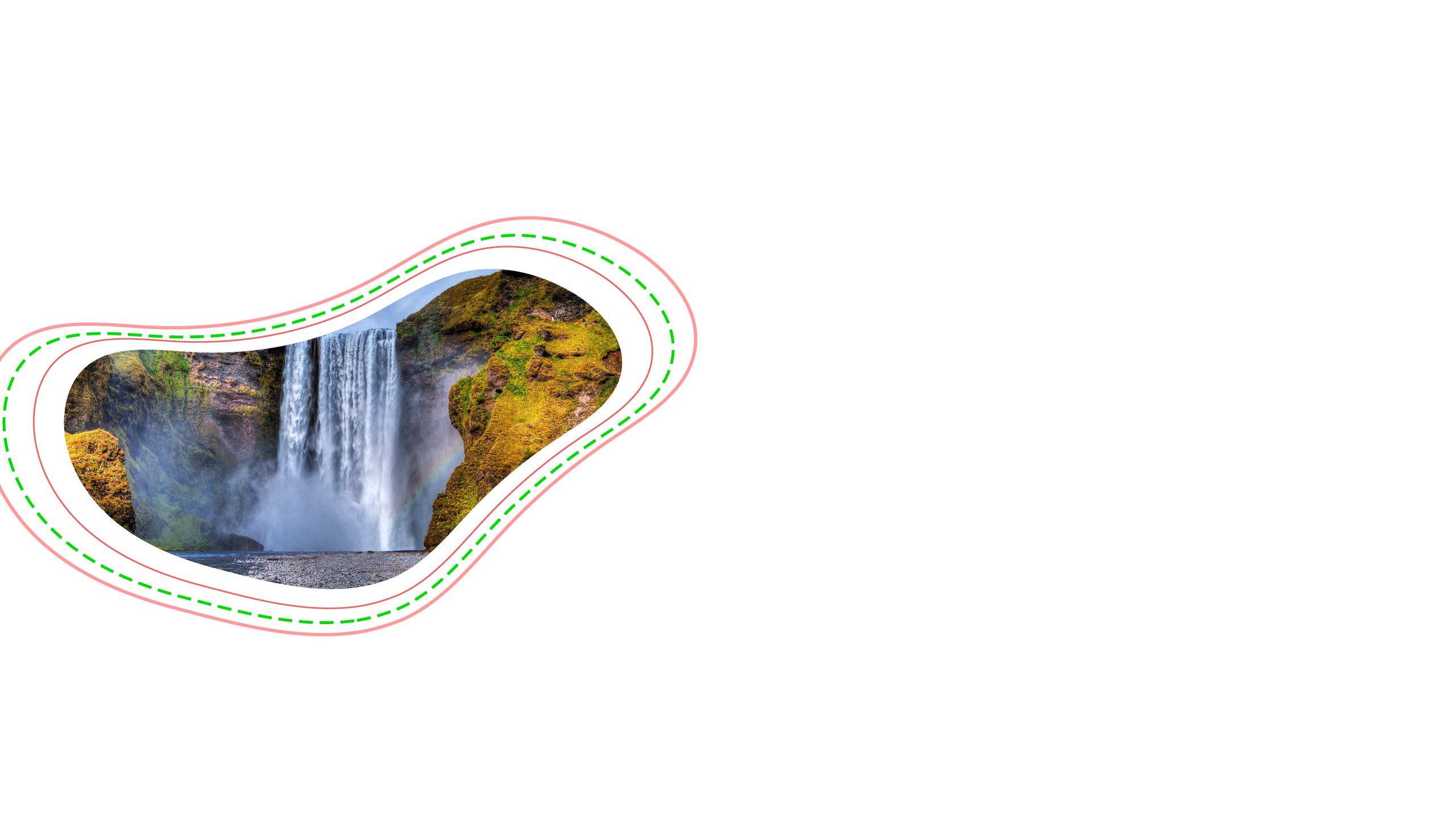
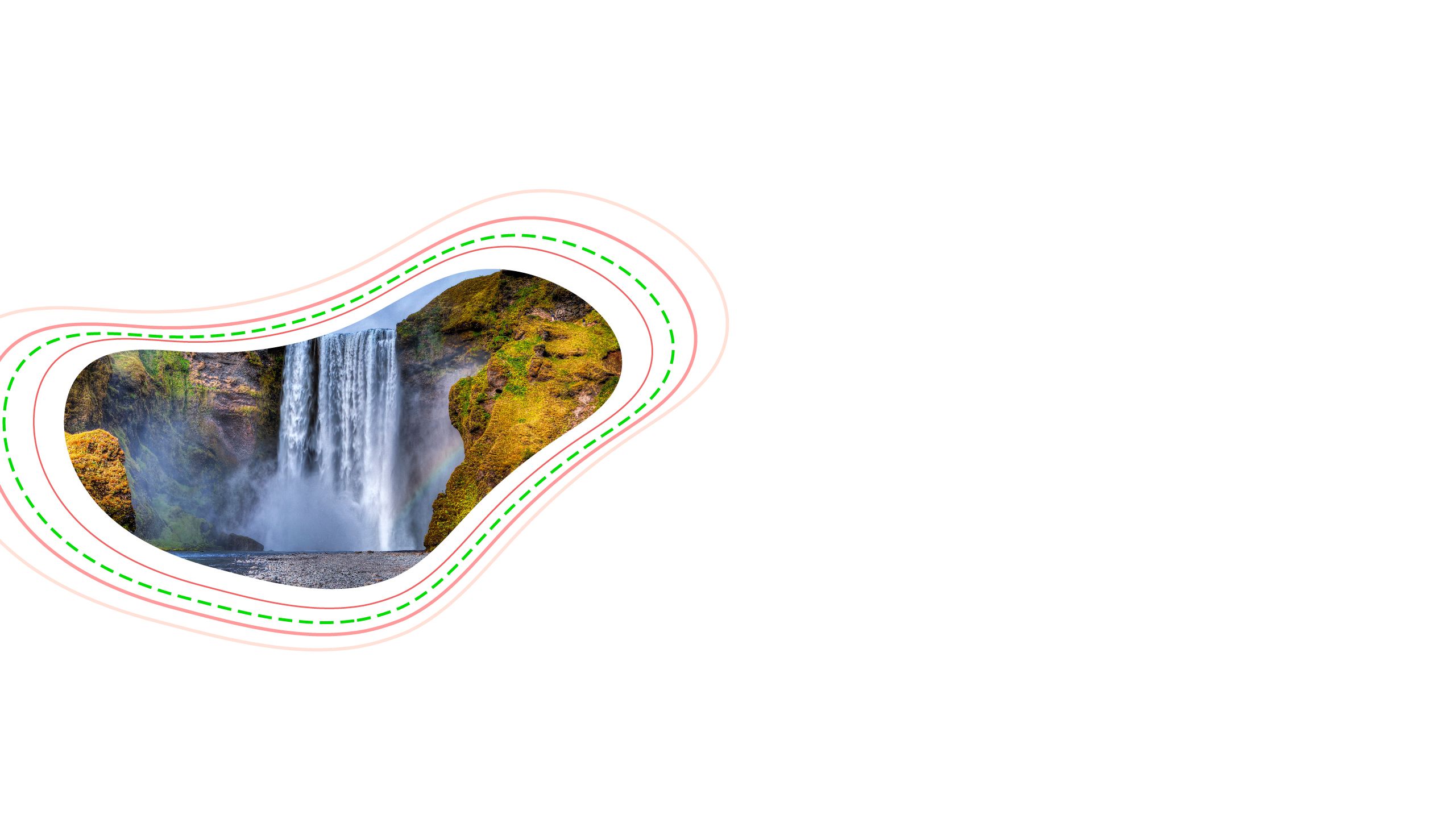
U.S.
Under U.S. law, a bankruptcy court has the equitable power to “subordinate for purposes of distribution all or part of an allowed claim to all or part of another allowed claim (or equity interest).” Interestingly, even though the power is codified in the U.S. Bankruptcy Code, the equitable principles that guide courts in wielding it are not. Although different bankruptcy courts have developed their own frameworks to determine whether equitable subordination is appropriate, they generally consider (i) whether the creditor was engaged in wrongful conduct, (ii) whether that conduct unfairly advanced the creditor or disadvantaged other creditors, and (iii) whether subordination would be consistent with other provisions of the U.S. Bankruptcy Code. Notably, a creditor’s bad acts typically do not need to be tied to the claim at issue. Typically, these claims are asserted against insiders or other debtor fiduciaries. However, nonfiduciary lenders have also been targets. In the lender context, courts have subordinated a pre-bankruptcy loan to equity status where, for example, the lender exercised undue influence or domination of the borrower to benefit itself and harm other creditors, committed fraud, or violated its contractual obligations to the borrower.
Claims of equitable subordination concerning debt may also be paired with claims for recharacterization i.e., a request that the bankruptcy court reclassify the debt in question as equity. This typically requires a debtor to show that, when the economic realities of the transaction in question are scrutinized, it is better viewed as a capital infusion than a true loan.
Finally, in the most egregious (and therefore rare) scenario, a court may allow a debtor to pursue tort claims against a lender whose flagrant misconduct caused or hastened the debtor’s bankruptcy.
Creditors should be cognizant of the doctrines of “abusive” support and equitable subordination when extending financial support to companies in distress. While fraud needs to be established in France to cross over the threshold, in Italy and Germany a more lax test is applied. A finding of “abusive” support can attract civil law liabilities in each of the European jurisdictions we have looked at, and in Italy lenders, risk being found criminally liable as well.
While there is no concept of “abusive” support in the U.S., remedies for claims of equitable subordination, which may also be paired with claims for recharacterization, represent significant tools in the bankruptcy courts’ arsenal allowing it to provide relief against inequitable or wrongful conduct by shareholder lenders and other creditors in distressed situations.





Claims of equitable subordination concerning debt may also be paired with claims for recharacterization i.e., a request that the bankruptcy court reclassify the debt in question as equity. This typically requires a debtor to show that, when the economic realities of the transaction in question are scrutinized, it is better viewed as a capital infusion than a true loan.
Finally, in the most egregious (and therefore rare) scenario, a court may allow a debtor to pursue tort claims against a lender whose flagrant misconduct caused or hastened the debtor’s bankruptcy.
Creditors should be cognizant of the doctrines of “abusive” support and equitable subordination when extending financial support to companies in distress. While fraud needs to be established in France to cross over the threshold, in Italy and Germany a more lax test is applied. A finding of “abusive” support can attract civil law liabilities in each of the European jurisdictions we have looked at, and in Italy lenders, risk being found criminally liable as well.
While there is no concept of “abusive” support in the U.S., remedies for claims of equitable subordination, which may also be paired with claims for recharacterization, represent significant tools in the bankruptcy courts’ arsenal allowing it to provide relief against inequitable or wrongful conduct by shareholder lenders and other creditors in distressed situations.
